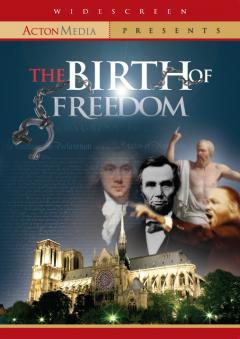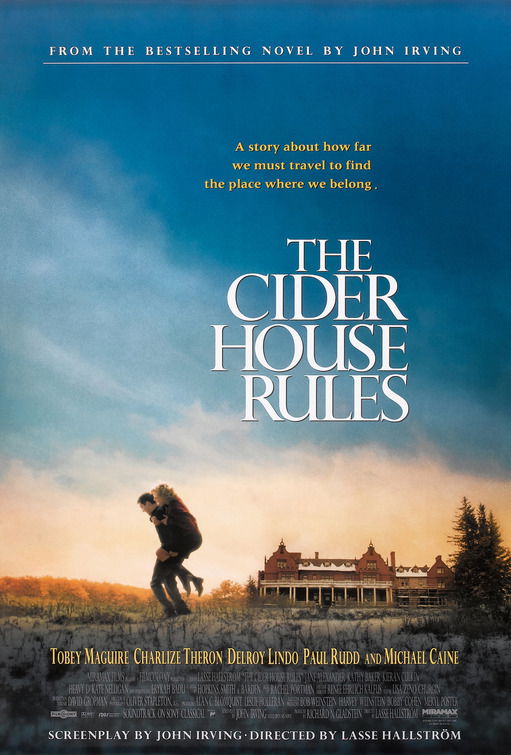"Rotten Apples"

| None | Light | Moderate | Heavy | |
|---|---|---|---|---|
| Language | ||||
| Violence | ||||
| Sex | ||||
| Nudity |
What You Need To Know:
THE CIDER HOUSE RULES is offensive on many levels. It insidiously manipulates viewers with blatant symbolism, heart-tugging scenes and votes for anarchy. Homer goes back home, just as so many white liberals go home after they’ve assuaged their guilt in a soup kitchen for an evening. Another bothersome element is the theme of incest. Premarital sex and unwed pregnancy are also rampant, despite the World War II setting. Obviously, moviegoers would be ill-advised to view this two-hour valentine to abortion advocates. If abortion activists had had their way, Mary would have scraped the Messiah into the sink.
Content:
(AbAbAb, PCPCPC, PaPaPa, RHRH, L, VV, SS, NN, DD, M) Strong anti-biblical, politically-correct, pagan worldview espousing endless pro-abortion preaching plus historical revisionism of American society in World War II; 7 obscenities & 2 profanities; murder by stabbing, fist-fighting & gory view of stitches; depicted adultery & implied incest; rear male & rear female nudity; drug abuse (ether) & smoking; and, deceit & lying.
More Detail:
Let MOVIEGUIDE® readers be warned: many critics will sing the praises of THE CIDER HOUSE RULES, the latest dramatization of a John Irving novel. They will call it “heartwarming” and “uplifting.” But, this modern-day parable is, in truth, an appalling movie. THE CIDER HOUSE RULES uses its homespun, ”Hallmark-Hall-of-Fame” approach to celebrate the “virtues” of abortion.
THE CIDER HOUSE RULES tells the tale of Homer Wells (Toby Maguire), a young man growing up in a remote orphanage in rural Maine. Doctor Larch (Michael Caine), an ether-abusing but kindly man, runs the orphanage and serves as a surrogate father to his charges. He considers Homer to be his protegee and trains him in medical skills until Homer can deliver babies and perform surgery with aplomb. Yet, the doctor and Homer differ on one issue: Dr. Larch performs abortions, which Homer insists is wrong. Homer argues that, if abortion were legal, he himself might have been aborted and that he is “happy to be alive.” The doctor insists that the young mothers who come to him are desperate and that he simply “gives them what they want” instead of telling them what to do, because “doing nothing” is wrong. “Our duty is not to leave things to chance,” he admonishes Homer. He claims, like all abortion advocates, that, if he does not give these women what they want, they will seek the procedure from amateurs and end up injured from a botched attempt. (Abortion advocates apparently fail to realize, or choose to ignore, the fact that such back-alley blunders were rare before abortion became legal. In the year before Rowe vs. Wade took effect, only 39 women in the entire United States sought treatment for injuries incurred after failed abortion attempts.)
One day a young couple, Wally and Candy (Paul Rudd and Charlize Theron), arrive at the orphanage to take advantage of Doctor Larch’s “services.” Homer finds himself smitten with Candy, and, once Candy’s abortion has been performed, asks the young lovers if he can leave the orphanage with them, wherever they may be going. Without showing any previous signs of restlessness, Homer has abruptly decided to trade his isolated yet secure home for the unknown excitement of the real world.
Wally and Candy take Homer to Wally’s parents’ orchard, where Homer decides to accept the unlikely position of apple picker. Wally, a soldier, soon leaves to go back to fight in World War II. Predictably, Homer and the lonely Candy soon begin a secret but uninteresting affair largely based on sex. The once-virginal Homer also learns to smoke and begins to question his moral view of the world.
Homer befriends his fellow apple pickers, who are migrants, and lives, eats and socializes with them in the cider house. Interestingly, the filmmakers never seem to question the likelihood that the bright, medically trained Homer would want to spend all of his waking hours with a group of illiterate, itinerant workers. The movie’s scenes of Homer dining chummily with his new pals are often almost laughably incongruous.
It doesn’t take a clairvoyant to foresee an event that soon rocks Homer’s world: one of the apple pickers, the unmarried Rose (an almost unrecognizable Erykah Badu), becomes pregnant. Homer finds out that Rose’s own father, the seemingly upstanding, intelligent Mr. Rose (Delroy Lindo), is guilty of impregnating her. Homer offers to take Rose to see Dr. Larch, but she insists that she “can’t go nowhere.” She also insists that she does not want to have her baby, and her reasoning is never questioned. It remains entirely unclear and unexamined why she could not have the child and give it to the orphanage. She is instead portrayed as a helpless victim who can’t be expected to think or to behave responsibly. Thus, Homer, faced with the dilemma of aborting Rose’s baby or “doing nothing,” chooses to follow in his mentor’s footsteps and perform the abortion.
Alas, Homer’s supposedly noble deed works no magic. The summary elimination of her baby does nothing to better Rose’s situation. As she recovers in bed, her father reaches out to comfort her. She panics, stabs him to death and then runs away. Although Homer’s abortion works no wonders and may have even worsened the situation, his choice is depicted as “good” simply because he elected to do something, no matter how misguided or abjectly wrong that action was.
All of this soul-searching and changing of heart eventually prompt Homer to return to the orphanage. There, he assumes Dr. Larch’s position as head of the institution and, presumably, abortionist extraordinaire after the doctor’s untimely death of an ether overdose. His journey to the world and back is painted as a rite of passage, from young naïf to worldly-wise man.
THE CIDER HOUSE RULES is offensive on so many levels. Its insidious manipulation of its audience with blatant symbolism and heart-tugging scenes, of orphans yearning for parents, of Homer picking shiny red apples in gorgeous mountain settings, of frantic young girls pleading with Dr. Larch for help, all in the name of abortion, is simply sickening. Even the movie’s title supports the pro-abortion theme. The “cider house rules” are a list of rules in the house where the migrant workers live and make cider. The workers burn the list, because “those rules weren’t written by the people who live here [in the cider house].” (Never mind that they were written by the people who own the cider house. Another vote for anarchy from the libertine left!) The analogy is obvious: since pregnant women (i.e., the keepers of the womb) were not the authors of abortion laws, the laws should be ignored and defied. Once the cider house rules have been destroyed, the workers declare that they will make their own rules, “every single day.”
THE CIDER HOUSE RULES has other knee-jerk liberal politically-correct elements. Homer’s epiphany about his oh-so-misguided anti-abortion views results from the time he spends with “simple folk,” but he doesn’t stay with the little people forever. He goes back home, just as so many white liberals go back to their suburban McMansions feeling enlightened after they’ve assuaged their guilt in a soup kitchen for an evening. Now that he has gained wisdom from commoners, he can return to the cloistered world of the orphanage to exercise his newfound morality upon the simple folk by killing their babies.
Another bothersome element is the theme of incest. When will Hollywood stop using incest as a contrived plot device whose only real contribution is titillation? And, when will movies cease depicting incest as common, practically ubiquitous? Both murder and incest are dangerously hovering toward banality in Hollywood. Mr. Rose shows no signs of being a depraved pervert, so his dastardly deed implies that incest could lurk in all men’s hearts, regardless of their apparent morals. Rose shows no suggestion of hatred or anger toward her father, then up and stabs him, as if anyone could commit murder under the right circumstances. Premarital sex and unwed pregnancy are also rampant in this movie, despite its World War II setting.
Obviously, MOVIEGUIDE® readers would be ill-advised to view this two-hour valentine to abortion advocates. It is especially galling that this movie arrives at theaters just when people are celebrating the birth of a technically illegitimate Child: Jesus Christ. If abortion activists had had their way, Mary would have scraped the Messiah into the sink.



 - Content:
- Content: 



